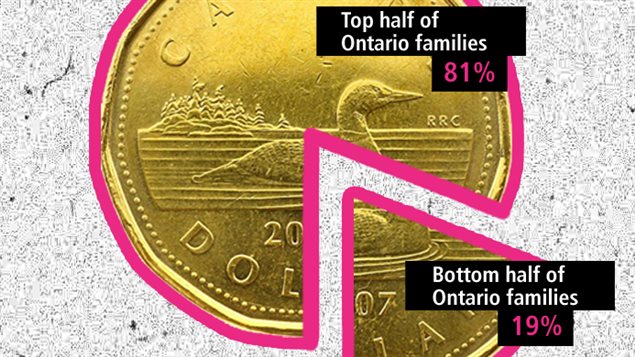Ontario has become a place where the poor are getting poorer and the rich are getting richer.
These are the findings of a study released today by the Canadian Centre for Policy Alternatives (CCPA) a left-leaning economic think tank.
At one time the province of Ontario was the economic engine of Canada, with a robust manufacturing sector and prosperity that was more widely shared.
Now, like many of what’s described as the “rust belt states” south of the border, most of those manufacturing jobs have gone off shore, and remuneration in many service jobs has remained stagnant, or been reversed.
“There are two different labour markets in Ontario”
Sheila Block, Senior Economist at the CCPA, is the author of the study entitled, ‘Losing Ground: Economic Inequality in Ontario 2000 – 15’.
ListenSheila Block says, “there are two different labour markets” in the most populated province in Canada.

“Families in the top half of the income distribution are getting an increasing reward for their work, but it’s really a totally different story for the bottom half.” she says.
“Their real wages have declined and they’re losing ground.”
Block wants to see the provincial government act to level the playing field in the labour market, first by raising the minimum wage in the province to $15 (Cdn) an hour.
There has been some debate about this move, currently included in legislation before the Ontario government.
Galen Weston Jr., the CEO of George Weston Ltd. was bemoaning the increase recently.
“We are flagging a significant set of financial headwinds,” Weston Jr. said in reference to minimum wage increase. He foresees the company’s labour costs increasing by about $190 million (Cdn) next year
George Weston Ltd. owns national grocery store chains Loblaws and No Frills as well as the drugstore chain Shoppers Drug Mart, among other chains and brands.
Loblaw is one of Canada’s largest private sector employers, with more than 192,000 full-time and part-time workers.
Meanwhile the company reported second-quarter profits $200 million higher this year than last, up to $358 million from $158 million (Cdn).
“We have fifteen years of peer-reviewed economic research that tells us that increasing the minimum wage does not have negative employment effects.” Block says.
“But what we do know is, it’s effective at reducing poverty and decreasing inequality” she says.
As Canada begins trade talks with the United States and Mexico Block says there’s not much at risk for the working poor who are generally employed in retail, and coffee shops, but what she will be watching for is the safeguarding of labour standards that stop “this kind of competition down to the lowest common denominator”.
(With files from CBC and CP)







For reasons beyond our control, and for an undetermined period of time, our comment section is now closed. However, our social networks remain open to your contributions.